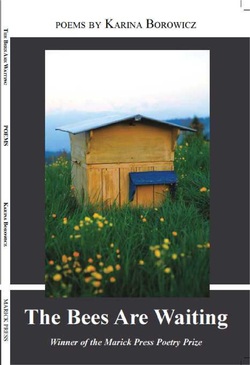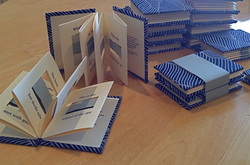 在玛丽拉•格里芙近乎“固执”的叙述中,流亡作为个人生活中的巨大伤痕,向我们展示了其残酷的一面。从而让我们看到诗歌其实是一种修正性的力量,具有治疗人生创伤的作用。而之所以如此认识,在于她的诗用准确的意象,有力的节奏,呈现出瞬间抓住阅读者的磁性。(孙文波,中国诗人,《当代诗》主编) In Mariela Griffor's persistent and almost "stubborn" narrative lyrics, exile as tragedy has presented its cruelest side, and therefore made us see the therapeutic effects in the "corrective" force of poetry to cure personal trauma. We've come to this impression through her precise imagery and powerful music in the poems which are magnetic as well as captivating.——Sun Wenbo, (Chinese poet, Chief editor of Contemporary Poetry in China) 当代国外诗歌译介到中国的文本中,很少见到如此震撼人的作品,作者具有罕见的理性,抒情既有强度又节制,舒缓适度,对经验和记忆的细节处理及其迷人。(蒋浩,中国诗人,《新诗》丛刊主编) In the contemporary foreign poetry translated into Chinese, there is hardly anything this shocking. The author has a rare rational mind. The lyrical voice is both intense and restraint. The details from the experience and memory are handled beautifully and skillfully. ——Jiang Hao (Chinese poet, Chief editor of New Poetry magazine in China) 玛丽拉・格里芙的《房子》提供了流亡诗篇的一个当代样式,诗人在感人的片断叙事中复活了那些与历史事件相关联的个人记忆,她的招魂术有使往昔重临于当下的魔力。这本诗集还昭示读者,诗歌不仅是抒情的艺术,也是抵抗遗忘和疗伤的艺术。(宋琳) Mariela Griffor's "House" offers a contemporary style of Psalms of Exile. The narrative fragments bring to life historical events associated with personal memories making those moments as if happening now. This collections of poems also shows to the readers that poetry is not only an art of lyricism, but also an art of healing resistan to forgetting at the same time. ——Song Lin (Poet and poet-critic from China)  Congratulations to Marick Press author Karina Borowicz! Winner of the 2014 Eric Hoffer First Horizon Award for The Bees Are Waiting!! The Bees Are Waiting was chosen by Franz Wright for the Marick Press Poetry Prize. It won the 2014 First Horizon Award, and has been named a Must-Read by the Massachusetts Center for the Book. It was a finalist for the T.S. Eliot Prize, the May Swenson Poetry Award, and the Del Sol Poetry Prize, as well as a semi-finalist for the Hudson Prize and the Crab Orchard Series in Poetry. It can be purchased online from Marick Press, SPD Books, or B&N, or ordered by your local bookseller.  As you all know, the Neruda project was a sucess and exceeded its strech goal. Thanks to all of you for your support. What else can I say? Perhaps, I Love You too!!!  Update #10 From Tupelo Press Apr 28 2014 64 Hours To Stretch! Comment Good morning dear backers! Our exciting Canto General Kickstarter campaign comes to its end in 64 hours! You've already given us enormous support. For this, we give you our warmest thanks. We'd still love to reach our stretch goal of $35,000 for the illustrated edition. We're so very close! If you are so moved, please consider this offer. For any additional gift of $100 or more we will send you one copy of this limited edition, miniature, letterpress chapbook of lines from Canto IV, "Liberators," from Neruda's Canto General (translated by Mariela Griffor). The chapbook is being made this very moment by Kirsten Miles at Virginia Arts of the Book Center, Charlottesville, Virginia. (The miniature Dickinson chapbooks we offered a few weeks ago went like hotcakes!)  Photo credit: Hector Gonzalez de Cunco Photo credit: Hector Gonzalez de Cunco In his Memoirs, Neruda speaks of his people and the house where he was given shelter in Los Lecheros on the shores of Valparaiso’s hills. He writes: "I was confined to a piece of room and a corner window where I was watching harbor’s life. From that tiny window my eyes covered only a fragment of the street. At night I saw people moving fast. It was a poor suburb in a little street, a hundred feet below my window, it monopolized all the lighting in the neighborhood. Small stores and bowling alleys filled it. " Today the house looks great on its facade a large plaque, which reads: "Here Pablo Neruda wrote in 1948 the Canto General"  Responding to your desire for a book that is both beautiful and affordable, here is our (revised) first Stretch Goal: For the next $10,000 we will commision illustrations, one for each Canto as well as for the flyleaf and cover. We are drawn to the work of Gabriela Vainsencher, an Argentinean-born Israeli artist living and working in Brooklyn. She is preparing a portfolio of preliminary drawings for our consideration. Here is one of our favorite pieces by Gabriela:  To promote our new stretch goal we have added a sweet reward for our most popular backer levels: for a donation of $100 you will receive a copy of Canto General PLUS a set of 3 refrigerator magnets designed by Gabriela Vainsencher. Or, for a donation of $40 you will receive the set of 3 Vainsencher refrigerator magnets. Another beautiful reward offered! For a pledge of $150 you will receive a copy of Canto General and a miniature letterpress book (hand printed and numbered, limited edition) by book artist Kirsten Miles with Holly Odom the Virginia Art of the Book Center. Choice of Pablo Neruda--eight lines from Canto IV, "The Liberators," Canto General OR of Emily Dickinson Poem #52. We're nine days into our Kickstarter project, and well on the way to reaching our first stretch goal of $10,000 to help fund the illustrated edition. We have already reached just over $2,500, 25% of our new goal! Check out our new rewards, including beautiful miniature letterpress chapbooks of verses by both our beloved Neruda and Emily Dickinson! Kirsten Miles, a member of a Book Arts organization in Charlottesville, Virginia, contributes five miniature books from a collection made by members. She explores the relationship of the book form to the poem with her cover art and unique "windows" and is working on a similar book with a verse from "The Liberators", from the Canto. The second book will also be letterpressed, with arboreal-themed cover art and windows into the canopy of the poem. The Emily Dickinson text is untitled poem #52 in Thomas Johnson's edition: "Whether my bark when down at sea . . ." The Neruda text is 8 lines from Canto IV, "The Liberators". Please tweet and share our project. Join us on our climb! BOYS
A torturer does not redeem himself through suicide. But it does help. - Mario Benedetti The boys from the neighbourhood, some of them, stay behind the mud and the rain. I ask myself what has become of Romero, Quezada, Coleman? Did their bodies and souls escape deterioration? Did they go into the army to do their duty as soldiers of the fatherland, the ones who protect us from hate and foreign tyrants? Did they climb like the General by usurping through disloyalty, lies, secret codes and finally through money? Did they have families and continue living in the city as if nothing had happened? Or did they sell their modest houses, move to another neighbourhood where no one knows anything about them? There they will come in the evening and will wash the remnants of dried blood from their fingers. Will they look for their wives, give them a kiss, touch their bodies with those same hands? Will their daytime nightmares be cast upon those who know nothing of where they come at the end of the night? Will they return their heads, smashed by the memories they left in the cells, streets, apartments to a soft warm pillow that washes away their sacrileges? What happened to the men I knew and never saw again? Did they turn themselves into men hungry for justice or did they leave little by little in silence? Did they put on their clothes in the morning without knowing whether they would return in the evening to their dear ones? Did they learn to kill in clandestine training or did they become more men with the passing of these hard times? Did they love like those pure men I met on those evenings when to play was all our universe? HOW CHAOS BEGINS A butterfly flying in the streets of Santiago on a September day. VALENTINE'S DAY IN DETROIT For E. The sounds of children playing in the snow, a bunch of orange roses and a sign ”By my Valentine“ on the round surface of this day. Are these moments similar to the ones we dreamt of? We couldn’t answer, we are not others. We are the ones standing still, almost faceless. Here we are inventing words on this hammock despite the baby spit. A house untied to the ground, a laundry room of nostalgias, a window clouded by little sleep, a coat of memories we remove every February, a simple grin and a Sanders chocolate box, then, we grow to the light like sweet peas. ABSOLUTION For M. Conejeros When the call of the rooster awakens me once again in the morning and the dark red of dusk enters through my pupils and doesn't hurt my heart, when my voice can pronounce again his name and the ground that I walk upon cannot be so hard and cold and winter disappears, when your children and my children can play all day without brawls, and the sounds of the street are all recognizable and clear, not foreign, you and I can look into each other’s eyes and discover that we still can smile, when you come looking for me and need to know if I am there, I will tell you that I’ve never left, I have always been waiting for an encounter, a tear that will fall down your cheek to wash way forever the misery of having lost him. April 10, 2001 DETROIT When I drive down from Grosse Pointe on Warren a sudden knot in my heart is born. Solitude is roaming with the images of a city broken and gone. I cross my fingers hoping I won't see any black cats crossing these steaming manholes. Detroit, so full of churches, so where is God? Could He be hiding under politicians'coats? A "mon cher" looked through my car window and believed he melted snow. His eyes aflame consumed two seconds when the red light stopped. City in flames, who took away your palaces? It was not me. I am a foreigner, I just came to see. Detroit, wake up from your profound sleep. Rebuild your empire. Rebuild it so I can see. Forget about black LaKeishas and your white Portias. Forget about your yellow Chengs and your brown Carolas. Let the golden haze that rusts on your aura shine proudly on your face again. Let a feeling of goodness drench the city like a storm. Let your dreams flourish and endure. Turn the holy fight into salutation. Let the happiness return. Leave your vinegar grief behind. Let me see, Detroit. Let me see. As I mentioned in previous notes and blogs my translation of the Canto General by Pablo Neruda is coming out from the small press Tupelo Press in MA. and they need to help to complete the project. Read below the information they put out to readers and participants:
Tupelo Press Project: Tupelo Press, a 501(c)(3) nonprofit literary press, are in the final stages of publishing the most important book of our 15-year history: a fully contemporary, English translation of Neruda’s monumental work, Canto General: the first translation by a native Spanish speaker, the first of the famous Chilean by a native Chilean, and the first by a woman. We are honored to be working with poet/translator Mariela Griffor and to have the blessing of Fundacíon Pablo Neruda to publish this book for the English-speaking public. A new translation for a new generation! Our Costs: We have already put years of time and money into this project. All we need now is $25,000 to cross the finish line and deliver the book to your hands. Here is the breakdown of remaining costs: $5,200/Polishing, Line- & Copy-Editing/"Making it Transcendent"-------- $3,000/ Book Design/"Making it Beautiful"----------- $12,000 /Printing/"Making it Real"-------------- $4,800/ Advertising and Publicity/"Spreading the Word"-------------- Total $25,000 With your contribution now we can publish this new Canto General, a new translation for a new generation! https://www.kickstarter.com/projects/979776234/329910534?token=8a81707b  Reviewed by Jim Welke The poetry in The Psychiatrist, written by Mariela Griffor and published by Eyewear Publishing, vibrates with enough resonant force to shatter the complacent sang-froid of any reader with at least an iota of empathy in their veins. The fifty poems recorded in this narrow volume do share revelations of interior, psychological torment to fit the title, The Psychiatrist, but they also reflect on the human condition at large, particularly the deleterious effects of political injustice on the human psyche. The numbing pressure of threatened violence plus the trauma of realized violence bears down on this verse, compacting and distilling it into the sort of clarity that a confrontation with imminent destruction induces: dilation of time, heightened sensory awareness, eerie calm. Often the violence, the trauma, occurs in recollection as though the writer invokes post-traumatic stress disorder. A riff on insomnia called “Poem without a number: house,” reads in part: I remember: a barricade. A homemade bomb made by my hands, the image of my lover and in my head a semi-automatic as redemption I beg forgiveness of all of you. The rain is too thin to stop the fire. My legs and arms are heavy. Behind me Santiago blazes and bullets whiz at the sight of who we were, ancestral pain I cannot shake off. His body disappears from the earth into the air. A heart spattered in the streets follows me in my defeat. Some of the work reflects on healing, but the injury hovers just out of sight, in shadow. In “Valentine’s Day in Detroit” Ms. Griffor eludes those demons for a spell when she sheds her “coat of memories:” A house untied to the ground, a laundry room of nostalgia, a window clouded by little sleep, a coat of memories we remove every February, a simple grin and a Sanders chocolate box, then, we grow to the light like sweet peas. Mariela Griffor, born in Concepcion in 1961, grew up in Chile during the sixties and seventies. She was twelve when General Augusto Pinochet — backed in Parliament by the Christian Democrats and the National Party, and encouraged if not overtly supported by the US government — led a coup d’etat against President Salvador Allende, who died that day at the presidential palace, La Moneda, either by murder or suicide depending on whose account you trust. (Does it matter? Allende resisted the assault for six hours with an AK-47 given to him by Fidel Castro.) For a succinct and remarkably lucid account of the events leading up to the coup, give a read to a piece Gabriel Garcia Marquez wrote back in 1974, “Why Allende had to die.” Pinochet’s junta wrested power from Allende on September 11, 1973 (Pinochet formally ascended to the presidency in 1974) and ruled until 1990. During his tenure, Pinochet and his minions ruthlessly suppressed opposition; mutilated bodies of his “enemies” appeared in the streets daily. Yet the opposition persevered, coalesced, resisted suppression. In “Sunday walk, urban talk” Ms. Griffor writes: In those days we didn’t need much. A heavy ammunition was resting in our hearts. None of wanted to be compared with Guevara. Too tiring. Too much. Almost a sacrilege. Not for what people think. None of us wanted to leave the country or experience any adventures. The level of influence exerted by the US government to expel Allende from power might be debatable (although cash infusions by the CIA to support a trucker and shopkeeper’s strike prior to the coup that accelerated decline of the economy and undermined Allende’s support seem fairly well documented), but the CIA admits support for the Pinochet regime after the coup. Banks and other corporations in the US also propped up Pinochet. A cynical proponent of realpolitik might argue that Pinochet would have consolidated power with or without US assistance, and thus it was in the US “interest” to buy influence. But that obscures the more notable opportunity missed by the US to stand up for the rule of law and the unassailable imperative of democracy. The US did nothing to roll back the coup and restore a democratically elected president to Chile’s executive branch. That constitutes a sin of omission that suggests de facto approval of Pinochet’s action, and by induction implicates the US government in the oppression, torture, and murder committed by Pinochet’s grim apparatus. While Pinochet consolidated power and “disappeared” the opposition, Ms. Griffor passed through her formative years. By 1980, she would have been nineteen years old and witness to indescribable turmoil in her country. The extent of her participation in the resistance may now be of importance only to her, but clearly she sacrificed and suffered to end the torture, bloodshed, and economic oppression that plagued Chile during her years there. In an excerpt from “Love for a subversive,” she writes: I remember only the scars over your lips, scars over your left eyebrow, the pieces of flesh missing around your nostrils. The pain of your scars wakes me up at night and I hurt as I did giving birth to your child. I don’t know with any certainty what to do next. The added pain of exile must only exacerbate the effects of that suffering and sacrifice: in 1985, age 24, she left Chile for Sweden, and in 1998 moved to Grosse Pointe Park, Michigan with her American husband. In “The Rain,” she writes: The sound of the rain in Michigan reminds me of the rugged winters in my old country the cold feet in old shoes, the fast sound of the water hitting the ground, the smell of eucalyptus in the air. I close my eyes and make a wish: wish I could see, for just a moment, your hair dancing over your face trying to escape the weather. At home in Michigan, her thoughts drift back to recollections crystallized in her consciousness by chaos induced adrenaline, ready to surface with heedless insistence when triggered by signal events like the whispering patter of rain, reminiscent of The Narrator in Proust’s “À la recherche du temps perdu.” And the poems in this volume propel you through time, backward and forward, with the lyrical grace of Ms. Griffor’s delicate phrasing. Her suffering as well as her joy, hope, idealism, fear, doubt, and thrill saturate these pages like a stain. If you read “The Psychiatrist,” you will feel what she feels, and that’s the amazing feat of finely polished poetry: the sensations conveyed are visceral and involuntary; sensations transcend literal interpretation of the words on the page. But pay attention, those sequences of words are artful and melodious; like songs, you can read these poems over and over and they continue to satisfy. That they appear in a language not her first passes understanding; they represent a Nabokov-ian achievement of language facility. While Ms. Griffor’s poetry stands on its own apart from the context of her life and the political atmosphere in Chile that influenced it during her early years, the context seems worth emphasizing for its relevance to the situation the United States and other western industrialized countries find themselves in now: growing wealth inequality, decline of the middle class, expansion of the ranks of working poor one bad day away from the streets, the obliteration of labor unions and social safety nets, the rise of religious fundamentalism and right-wing intolerance of anyone near the margin of society, and the growing influence of corporate money in political decision-making. All of these afflictions were endemic in Chile in the 1970’s when Allende finally achieved election to the Presidency after many previous tries. He sought to undo the economic and political inequity in Chile, and thus represented a grave threat to the status quo, both in Chile and abroad. The entrenched, comfortable right felt as much fear of Allende as the disenfranchised, restive left felt gratitude for him. Perhaps it stretches credulity not much at all to imagine that social upheaval on a similar scale might grip some rich industrialized nation in a decade or two if the pendulum of political influence wielded by the oligarchic right does not soon reach its apex. Opposition does exist. Some might judge the Spanish Indignados movement followed by the Occupy movement failures, but these might be the first groans of a sleepy giant awakening. Certainly the Occupy movement gained traction much faster and wider than anyone anticipated, even the inspired crew in Zuccotti Park. While any sane citizen hopes for a gentle political solution to untenable inequality, the danger posed by a fearful right should not be dismissed. The right reacted instantly to the Occupy movement with fear and loathing, i.e. “smelly hippies.” Fear often motivates irrational behavior more forcefully than anger. If the reaction of the right in the US to the election of the timid, compromise-seeking Barack Obama offers any insight, imagine the corporate-financed reaction to the election in either Western Europe or the United States of an all out Socialist modeled after Allende. Chile’s past might be prologue for any number of nations that find themselves drifting toward the unknowable tolerance threshold of the poor for obvious, pernicious inequity. Greece recently spun unnervingly near to anarchy. It would be deliberately obtuse to ignore instability of the system we’ve created, or allowed others to create as a result of our indifference and passivity. With Ms. Griffor’s personal reminder of the depths as well as the summits human compassion and aspiration can reach, those of us pre-occupied with “first-world” problems might pause for a moment and reflect on the fragility of our existence: economically, politically, and environmentally. History marches on indifferent to the quiet wishes of passive bystanders; history heeds only the demands of the forceful. Surely there will be resolution to growing inequity; the question will be how do we achieve it? Acute pain often yields fine art. If we pause and read a bit of poetry, listen to the murmuring oracles in our midst, we might manage to vote our way toward collective sanity, if we scoff at wisdom we might again see rockets falling on the palace roof. Mariela Griffor’s The Psychiatrist offers a good place to start. From “Sunday walk, urban talk:” Ignacio, what happened? We were almost sure we would make it out alive. What kind of country is this that falls in love with death every time freedom disappears from its core? What kind of country is this that kills its own sons and daughters ******* Please have a look at our site, artifizz.org, and check out our other reviews. And don’t forget to like our facebook page |
Name: Mariela Griffor Categories |


 RSS Feed
RSS Feed
